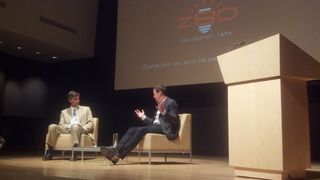I was watching this Charlie Rose interview with Lena Dunham and I was struck by this line:
it’s really intense to be thrust into a managerial position before my time
I have seen this a lot in my business and its always your talent for making things that puts you in this spot. And one of the big challenges is that the "managerial position" (as Lena calls it) is often in conflict with the talent for making things that got your there in the first place.
I am not saying that folks who are talented at making things aren't talented at managing people. I have come to believe that most people can be talented at managing people if they want to be. What I am saying is the time and energy and passion for making things can be all consuming and managing people can also be all consuming. Doing both well is really hard.
When we had our USV CEO summit last fall, we kicked it off by asking each founder/CEO to open with the one thing they had learned the hard way during the year. The recurring theme was that they had to let the people they hired do the work even though they wanted to jump in and do it themselves. And as they are all going around the room telling this story over and over, I am thinking "and I want you to jump in and do the work too". Because these are the people who made the thing that got us to invest, the thing that we fell in love with, the thing we believe is big enough to build a business around.
One of my favorite stories is about an entrepreneur I visited in his office away from the office. That he had one is in and of itself is telling. He was playing his acoustic guitar and singing when I arrived and I said "wow. I didn't realize you were such a talented musician". He said, "I am an artist and the most impactful art that my generation can make is websites but I see myself first and foremost as an artist." And I thought, "well it is a shame that you can't hang a website on a wall and move on to the next one."
There are a number of ways to handle this conflict that arises between the maker in you and the manager in you.
Many artists stick to making and hire a manager to focus on their business. Artists that build websites and mobile apps can do that too. In a perfect world, the manager and the maker become partners and operate the enterprise as a duo connected at the hip. The Gotham Gal and I once watched a movie about Valentino and his partner Giancarlo Giammetti and I was struck at how well defined their two roles were in their business endeavors.
You can devote yourself totally and completely to the manager role and hire people to lead the making effort. That is what many of the founder and CEOs in our portfolio have chosen to do, at least in theory. As our CEO Summit discussion pointed out, that approach is riddled with tension and conflict because makers want to make at their core and being a hired maker working for a founder/CEO maker isn't a party. It can work but it will never work perfectly.
The third way is to keep your hands in both efforts. To be both the maker and the manager. The challenge with that approach is you have two full time jobs and I have not seen many who can do both as well as they need to be done. Some choose to hire leaders below them to lead the making and managing teams but then keep ultimate responsibility for both. That can work, but defining when you plan to step in and make the calls and when you won't is tricky.
I cannot and will not recommend one of these approaches over the other. Each founder/CEO has to figure out what will work best for him or her and then build the team around them appropriately. As always, the hires are critical. Some hired leaders can deal with a founder who drops in on the decision making process better than others. If you are the meddling kind, you should find someone who can handle meddling well. But understand that nobody handles meddling exceptionally well. Pick your battles carefully.
What I can recommend is that you stare at the elephant in the room, name it, and deal with it. The maker/manager conflict sits at the heart of many of the development challenges that founder/CEOs deal with as they scale their companies and scale themselves. Conquering it is possibly your greatest opportunity and will lead to your biggest success.










